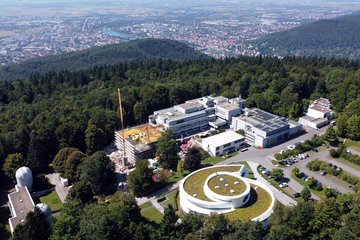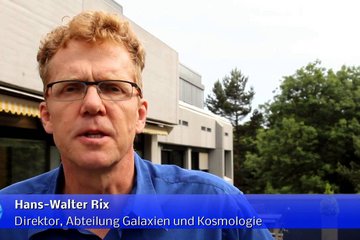Data Science Department
Our Mission
The Data Science (DS) department supports all MPIA members in conducting novel, cutting-edge research and in establishing MPIA as a worldwide leader in astronomical data science.
The data science group supports researchers across all MPIA departments. We focus our activities in four primary areas:
Foundational Skills: We help researchers strengthen their data management, analysis, and coding skills and build a solid foundation in modern software engineering and data practices. Our activities include running hands-on workshops, curating educational resources, and providing personalized support for learning and development. Join our in-person workshops (see the newsletter below for dates and topics), attend office hours (see details below), or make an appointment to take advantage of these opportunities.
Innovative Solutions: We foster an environment where researchers can explore and develop solutions to scientific and technical challenges. Through collaboration, brainstorming, and consultation, we support the creation of new methods, tools, and workflows that advance astronomical research. Please Make an appointment to discuss your ideas with us.
External Presence: We connect with peers, institutions, and industry to share knowledge and shape emerging technologies. By building strong collaborations and engaging internationally, we help accelerate scientific discovery and amplify MPIA’s presence in the broader data science community. Please reach out via email if you’d like to discuss collaboration opportunities.
Career Development: We support researchers in planning and advancing their careers, both within and beyond academia. Our efforts include discussions about career paths, CV and résumé reviews, guidance on skill development, and networking opportunities that foster professional growth. We offer one-on-one sessions that can be reserved here (Iva) or here (Morgan) to discuss your specific goals.
Contact
For MPIA researchers:
- Slack: mpia-institute.slack.com in the #data-science channel (or DM us anytime)
- Email: ds@mpia.de (from an @mpia.de address)
- Book a meeting: https://calendly.com/mpia-data-science
- Drop-ins welcome: Our doors are open — Iva (office 218), Morgan (office 332)
Community office hours (drop-in, no sign-up required):
Coffee & Cookies Coding Time: Mondays, 14:00–16:00 in the Besprechungszimmer (3rd floor)
External inquiries:
Please get in touch with the relevant group member directly by email. We are unable to respond to marketing requests or unsolicited job applications that fall outside the student opportunities listed below.
Research & Projects
We are involved in several international astronomy projects as researchers and in functional roles. Our areas of interest include:
- Machine learning and probabilistic inference for astronomical data
- Large-scale data processing and distributed computing
- Software engineering, data pipelines, and reproducible research practices
- Statistical modeling and uncertainty quantification
- Cross-calibration and integration of heterogeneous survey data
- Visualization and interactive analysis of complex datasets
- Development of public data services, APIs, and open-source tools
Current projects:
- Euclid: an ESA mission that will map the geometry of the Universe to understand dark energy and the evolution of cosmic structure. We are involved in studies of galaxy evolution.
- Roman: a NASA mission, planned to launch in 2026, that will conduct wide-field infrared surveys to study dark energy, exoplanets, and the structure of the Universe. We are involved with the High Latitude Wide Area Spectroscopic Survey.
- JWST: We are involved in several surveys that use the spectroscopic capabilities of JWST to explore galaxy evolution and cosmology.
- LSST: will image the entire southern sky repeatedly to study transient phenomena, map the Milky Way, and probe dark matter and dark energy.
- Gaia: a mission charting a precise three-dimensional map of over a billion stars to reveal the structure, dynamics, and evolution of the Milky Way. We are involved in deriving the physical properties of objects observed with Gaia.
- Gaia Unlimited: a project to characterize the selection function of the Gaia survey
- Pristine: a program to search for the most metal-poor stars in the Galaxy
- Phat/Phast/Phatter: Panchromatic Hubble Andromeda Treasury and Triangulum Extended Region – UV-optical-NIR photometry for >200 million stars in M31, M33
Group Members
In addition to the long-term staff members (left column), the following are also members of the group:
- Dr. Raphael Hviding – Postdoctoral Researcher – AGN and galaxy evolution
- Dr. Aarya Patil – LSST Discovery Alliance Catalyst Postdoctoral Fellow – Milky Way formation and evolution
- Mr. Yang Chen - MSc Student - Galaxy evolution
Opportunities
We welcome visitors who work at the intersection of astronomy and data science, including data analysis, software development, and methodological innovation. Please reach out if you would like to give a talk, meet with the group, or do a working visit. Visitors must be self-funded at this time. Please email us to inquire about opportunities. Our group meetings are open to all: please join us on Mondays at 13:00 in the 3rd floor Beschprechungszimmer at MPIA.
We can supervise students at the University of Heidelberg for BSc and MSc thesis projects. A list of example projects is available here, and we are open to discussing other ideas. We can also supervise external students (those not enrolled at the University of Heidelberg) if the project is part of their academic curriculum and carries credit at their home institution. Successful candidates for our group have strong programming skills. Previous research experience is a plus. We review applications submitted through this form four times a year. Please specify in your application which project you are interested in working on.
We support applications through external funding programs such as Fulbright, DAAD, Erasmus, and others for projects related to data science, software engineering, and the missions or collaborations we are involved in. Please reach out at least six weeks before the application deadline to discuss potential project ideas.
A full description of pre-doctoral opportunities at MPIA is available here. We currently have no open positions for PhD students, postdocs, or staff.
Resources
Substack - MPIA Data Science Group Newsletter (bimonthly updates, weekly paper summary)
GitHub/mpi-astronomy - MPIA GitHub organization
FAQ - A repository of frequently asked questions
Training materials - A list of materials used in our workshops
XarXiv - A list of recent arXiv papers cross-posted between astronomy, cs.AI, and physics.data-an, cs.LG, stat.*
awesome-astro-datascience - A list of resources for Astronomy Data Science









